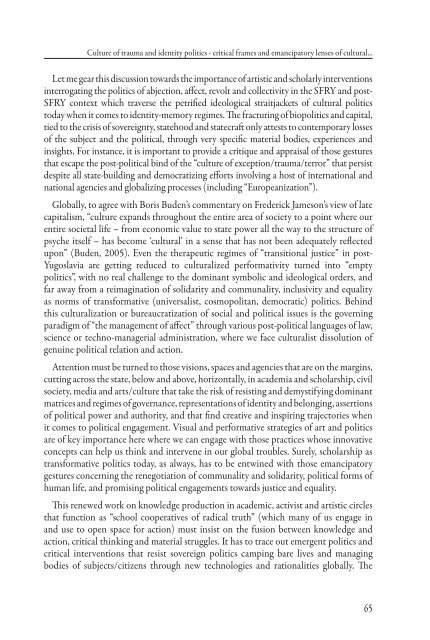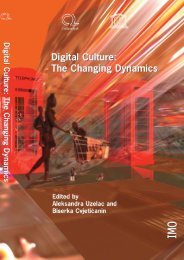free download in pdf format - Culturelink Network
free download in pdf format - Culturelink Network
free download in pdf format - Culturelink Network
Create successful ePaper yourself
Turn your PDF publications into a flip-book with our unique Google optimized e-Paper software.
Culture of trauma and identity politics - critical frames and emancipatory lenses of cultural...<br />
Let me gear this discussion towards the importance of artistic and scholarly <strong>in</strong>ter ventions<br />
<strong>in</strong>terrogat<strong>in</strong>g the politics of abjection, aff ect, revolt and collectivity <strong>in</strong> the SFRY and post-<br />
SFRY context which traverse the petrifi ed ideological straitjackets of cultural politics<br />
today when it comes to identity-memory regimes. Th e fractur<strong>in</strong>g of biopolitics and capital,<br />
tied to the crisis of sovereignty, statehood and statecraft only attests to contemporary losses<br />
of the subject and the political, through very specifi c material bodies, experiences and<br />
<strong>in</strong>sights. For <strong>in</strong>stance, it is important to provide a critique and appraisal of those gestures<br />
that escape the post-political b<strong>in</strong>d of the “culture of exception/trauma/terror” that persist<br />
despite all state-build<strong>in</strong>g and democratiz<strong>in</strong>g eff orts <strong>in</strong>volv<strong>in</strong>g a host of <strong>in</strong>ternational and<br />
national agencies and globaliz<strong>in</strong>g processes (<strong>in</strong>clud<strong>in</strong>g “Europeanization”).<br />
Globally, to agree with Boris Buden’s commentary on Frederick Jameson’s view of late<br />
capitalism, “culture expands throughout the entire area of society to a po<strong>in</strong>t where our<br />
entire societal life – from economic value to state power all the way to the structure of<br />
psyche itself – has become ‘cultural’ <strong>in</strong> a sense that has not been adequately refl ected<br />
upon” (Buden, 2005). Even the therapeutic regimes of “transitional justice” <strong>in</strong> post-<br />
Yugoslavia are gett<strong>in</strong>g reduced to culturalized per<strong>format</strong>ivity turned <strong>in</strong>to “empty<br />
politics”, with no real challenge to the dom<strong>in</strong>ant symbolic and ideological orders, and<br />
far away from a reimag<strong>in</strong>ation of solidarity and communality, <strong>in</strong>clusivity and equality<br />
as norms of trans<strong>format</strong>ive (universalist, cosmopolitan, democratic) politics. Beh<strong>in</strong>d<br />
this culturalization or bureaucratization of social and political issues is the govern<strong>in</strong>g<br />
paradigm of “the management of aff ect” through various post-political languages of law,<br />
science or techno-managerial adm<strong>in</strong>istration, where we face culturalist dissolution of<br />
genu<strong>in</strong>e political relation and action.<br />
Attention must be turned to those visions, spaces and agencies that are on the marg<strong>in</strong>s,<br />
cutt<strong>in</strong>g across the state, below and above, horizontally, <strong>in</strong> academia and scholarship, civil<br />
society, media and arts/culture that take the risk of resist<strong>in</strong>g and demystify<strong>in</strong>g dom<strong>in</strong>ant<br />
matrices and regimes of governance, representations of identity and belong<strong>in</strong>g, assertions<br />
of political power and authority, and that fi nd creative and <strong>in</strong>spir<strong>in</strong>g trajectories when<br />
it comes to political engagement. Visual and per<strong>format</strong>ive strategies of art and politics<br />
are of key importance here where we can engage with those practices whose <strong>in</strong>novative<br />
concepts can help us th<strong>in</strong>k and <strong>in</strong>tervene <strong>in</strong> our global troubles. Surely, scholarship as<br />
trans<strong>format</strong>ive politics today, as always, has to be entw<strong>in</strong>ed with those emancipatory<br />
gestures concern<strong>in</strong>g the renegotiation of communality and solidarity, political forms of<br />
human life, and promis<strong>in</strong>g political engagements towards justice and equality.<br />
Th is renewed work on knowledge production <strong>in</strong> academic, activist and artistic circles<br />
that function as “school cooperatives of radical truth” (which many of us engage <strong>in</strong><br />
and use to open space for action) must <strong>in</strong>sist on the fusion between knowledge and<br />
action, critical th<strong>in</strong>k<strong>in</strong>g and material struggles. It has to trace out emergent politics and<br />
critical <strong>in</strong>terventions that resist sovereign politics camp<strong>in</strong>g bare lives and manag<strong>in</strong>g<br />
bodies of subjects/citizens through new technologies and rationalities globally. Th e<br />
65



